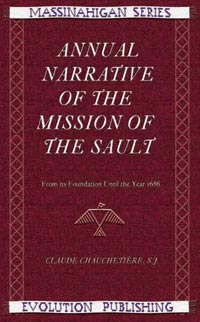Le livre des sept nations, ou Paroissien iroquois : auquel on a ajouté, pour l'usage de la mission du lac des Deux-Montagnes, quelques cantiques en langue algonquine.
[trans: The book of the Seven Nations, or Iroquois Prayer Book: to which is added, for the use of the Lake of Two Mountains mission, some hymns in the Algonquin language.]
Rev. Jean André Cuoq. Pub. Montreal, 1865.
The "Paroissien" is a French liturgical and devotional book described by Cabrol in his The Mass of the Western Rites as follows:
Prayer Books ("Paroissiens").(2)--The history and bibliography of these books is yet to be written...In them the Mass naturally has its place, whether the Latin text is given, with a translation, or whether we find merely explanations and commentaries, as was the usual practice at a certain period, when translation into the vulgar tongue was looked on with very little favor if not actually condemned.Today the liturgical movement has driven the faithful more and more towards requiring the complete text of the Latin Mass, with its translation. Thus certain prayerbooks are indeed real Missals for their use.
(2) The word cannot be translated literally. A "Paroissien" is a kind of abridged Missal which includes the office of Benediction, several Litanies, morning and night prayers, etc. Vespers of Sunday (and sometimes Compline) are also included. (Note by translator.)
Cuoq's Tsiatak Nihonon8entsiake was intended primarily for use at Oka (Mohawk Kaneshatake, English Lake of the Two Mountains),although it contains additional material from the Kahnawake mission as well. At Oka there were a significant number of both Iroquois and Algonquins, so both of these languages are represented in it, although the Algonquin material is mainly limited to hymns and the Ordinaries of the Mass.
This book is a greatly expanded edition of Cuoq's previous Ienenrinekenstha Kanesatakeha (1864).
Contents:
- intro matter.: Table of dates and Movable Feasts, table of Fixed Feasts
- p. 3ff.: Mohawk-language Gregorian chant, including settings for the ordinaries of the Mass (Kyrie, Gloria, Credo, Sanctus, Agnus Dei), other liturgical settings (Asperges, Vidi Aquam, Te Deum, Requiem, Dies Irae, Veni Creator and many others) along with texts for hymns and litanies (some in Latin).
- p. 109ff.: Book of songs for the Mass and Vespers—includes many of the Sunday readings for the entire liturgical year along with hymns.
- pp. 295ff. Formulary of prayers by M. Marcoux, missionary of Sault St. Louis]. The Stations of the Cross, Rosary, and novena to St. Francis Xavier in Mohawk
- pp. 411 ff. Supplement to canticles and prayers: hymns, prayers during Mass, the Algonquin Mass and chant for the dismissal (Ite, Missa Est).
Note on the Algonquin Mass
The Algonquin Mass is listed on pages 436-437, and features the text only (no chant) of the Terribilis, the Gloria, the Credo, Sanctus, and Agnus Dei, as well as the Laudate Dominum (Psalm 117). A native-language Kyrie is notably absent; probably it was sung in the original Greek, which seems to have been a general characteristic of the Masses of the Algonquian linguistic family (cf. Durocher's Montagnais Missal, Belcourt's Ojibwa Anamihe-masinahigan). In Iroquoian Masses, the Kyrie was translated into the vernacular.



